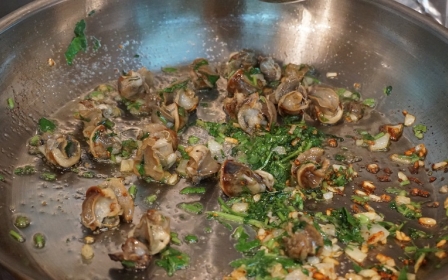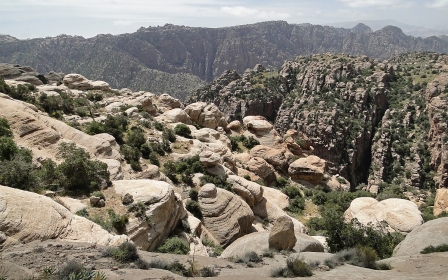In pictures: The endangered tradition of salt farming in Lebanon
The period between early June and September is salt extraction season in the northern Lebanese town of Anfeh. Salt mining has been an industry in the region for thousands of years, and the techniques used by salt farms along the Lebanese coast today have been passed down from generation to generation. With the privatisation of large tracts of the Lebanese coastline, the future of the age-old tradition is threatened. (All pictures by Hasan Shaaban)
Anfeh has long been Lebanon's salt capital, and the industry that built up around the mineral's extraction led to a period of prosperity for the town, which in turn led to its development as a tourist hub. The industry was particularly successful during the 90s, a period during which Lebanon produced around 45,000 tonnes of salt every year and had no need for imports.
The extraction method works by drawing sea water into an artificially constructed shallow pool using windmills and allowing the water to evaporate, leaving white crystals of salt that are then gathered up in large sacks for sale. Middle East Eye visited a salt farm owned by George Malik and his family. He says that his grandfather began working in the salt industry in 1920, passing his operation down to his son, George's father. "I continue today to preserve the heritage of the profession," says Imad Malik, George's son. "I spent my childhood here in the salt ponds, in the sea, and on the beach."
A worker on George Malik's farm poses for a picture. Despite many locals being dependant on the salt industry for their livelihood, the town's coast is under threat from property developers. Under Lebanese law, the coastal region is public property, but amendments and loopholes mean that vast areas of land could be made available to real estate developers for the construction of entertainment districts, hotels and residential properties. The future of the salt industry is therefore uncertain.
A kilogram of salt produced in Anfeh can sell for between $2 and $4, but producers face competition from foreign imports. During the Lebanese civil war between 1975 and 1990, many salt farmers fled the region or the country entirely, resulting in a drop in production and leading to the government dropping import duties to make up for shortfalls.
Some salt producers believe that the Lebanese government is deliberately trying to force them out of the industry by refusing to grant them licenses to repair their equipment. They say that by making it harder and more expensive for them to earn a living, officials are trying to force them to quit the industry and clear the way for the developers.
Locals refer to the salt produced in Anfeh as "white gold". Its reputation dates back to ancient times, with one cuneiform tablet dated to around 1400 BCE praising the quality of the region's produce.
In this picture, George Malik and his wife Jinan shovel salt into sacks for storage. The plan for development projects in Anfeh has been criticised by prominent politicians, including Walid Jumblatt, who condemned the idea as a "pretentious" threat to the local environment. The veteran politician said those behind the developments did not value the region's heritage and traditions, and slammed ministers for allowing the projects to proceed.
This article is available in French on Middle East Eye French edition.
Middle East Eye delivers independent and unrivalled coverage and analysis of the Middle East, North Africa and beyond. To learn more about republishing this content and the associated fees, please fill out this form. More about MEE can be found here.




